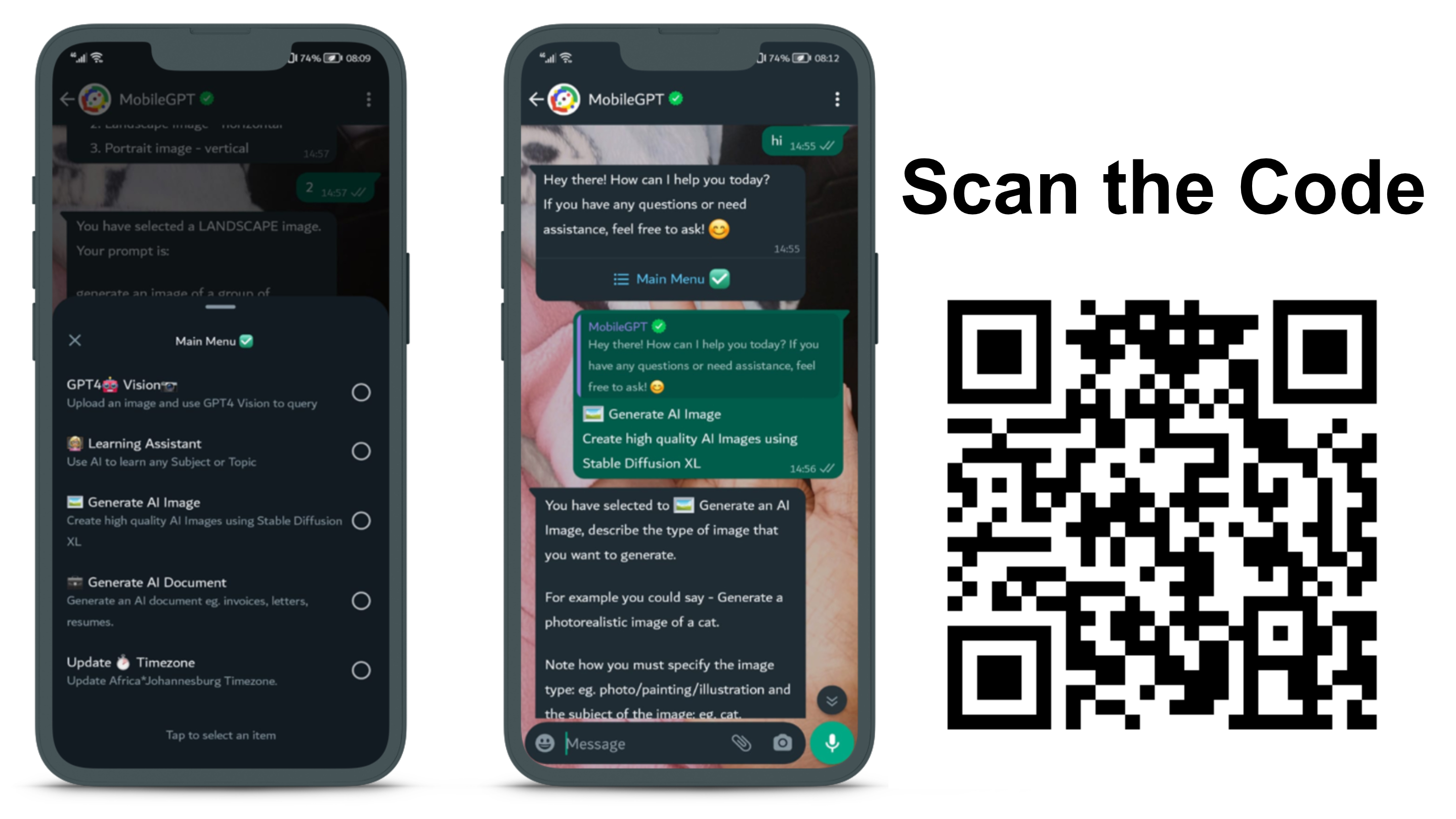AI-Powered Creativity: Leveraging Generative AI for Digital Strategy, Marketing, and Content Creation
Generative AI, a subset of AI, is particularly noteworthy for its role in creativity and innovation. This technology goes beyond data analysis and task automation, venturing into the realm of creating new, original content. Whether it's generating realistic images, composing music, writing stories, or even creating art, generative AI has the potential to democratize creativity, making it more accessible to those without traditional skills or training.
The fusion of artificial intelligence (AI) with creative processes stands as a beacon of transformative potential. This blog focuses on AI-Powered Creativity: Leveraging Generative AI for Digital Strategy, Marketing, and Content Creation. It aims to unpack the multifaceted ways in which generative AI is reshaping the fields of digital strategy, marketing, and content creation.
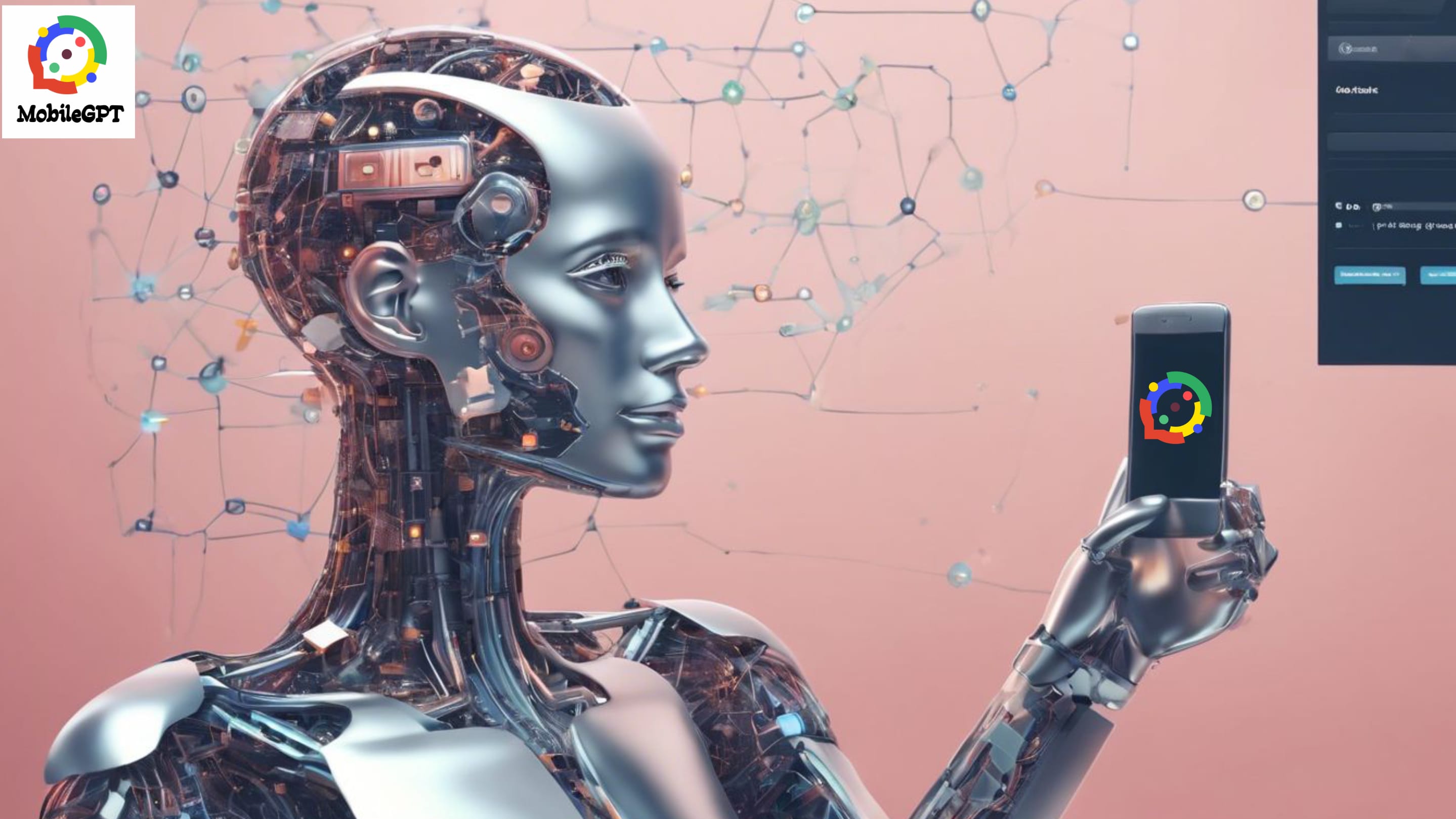
This blog will focus on the following key areas:
- The Role of Generative AI in Creativity and Innovation
- Part 1: Digital Strategy with Generative AI
- Part 2: Marketing with Generative AI
- Part 3: Content Creation with Generative AI
The Role of Generative AI in Creativity and Innovation
The innovation brought about by generative AI is not limited to art and entertainment. In business, for example, it can generate unique marketing copy, design product prototypes, or come up with innovative solutions to complex problems. This capability to generate new ideas, patterns, and solutions is invaluable in an era where innovation is a key competitive advantage.
Generative AI's impact on creativity and innovation is profound, offering a glimpse into a future where human and machine collaboration opens up new vistas of creativity. It challenges our traditional notions of artistry and creativity, encouraging us to rethink the boundaries between technology and human expression. As we continue to explore the capabilities of generative AI, its role in fostering a new era of digital creativity and innovation is undeniable, promising to reshape our world in exciting and unexpected ways.
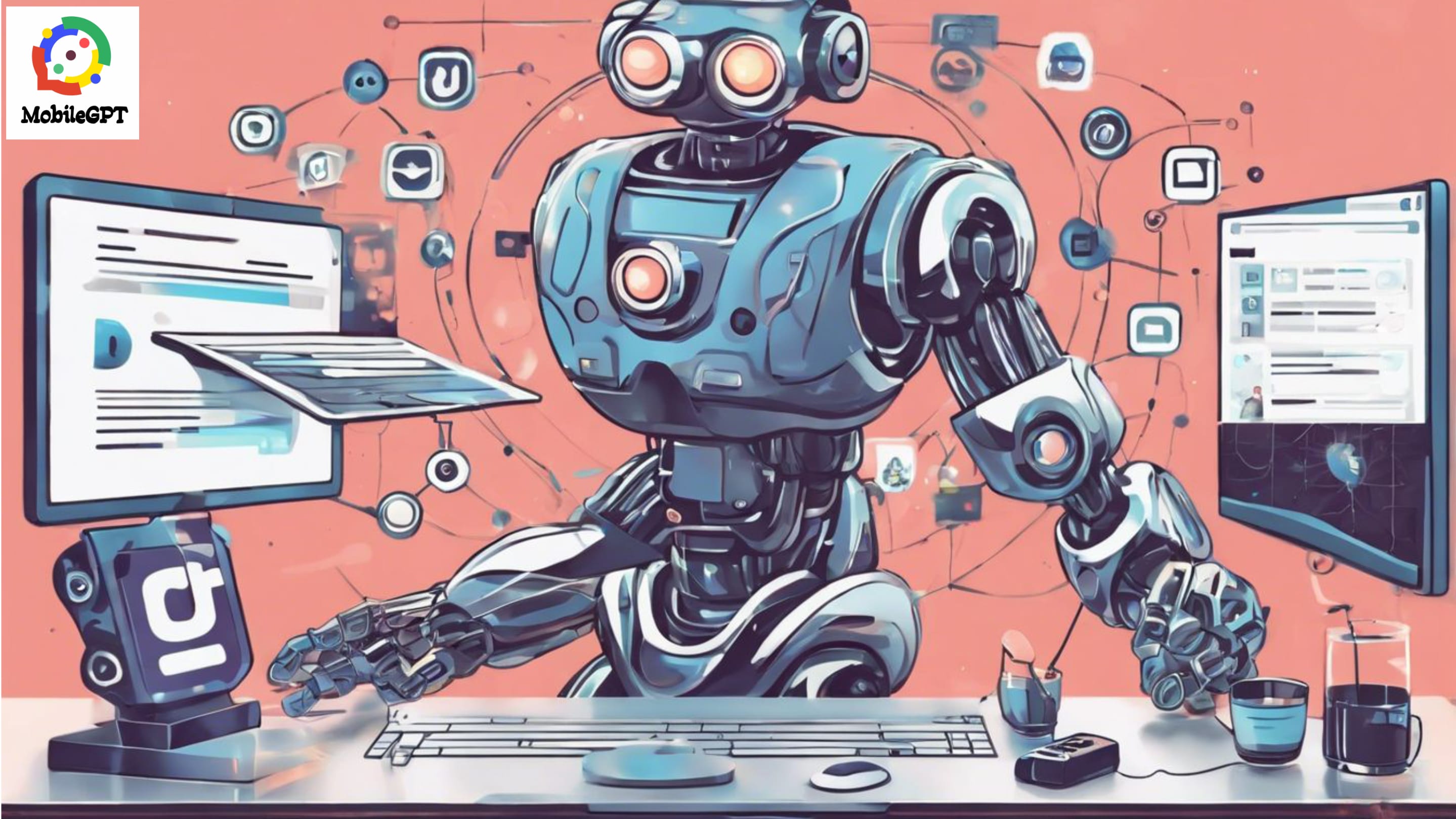
Part 1: Digital Strategy with Generative AI
In the rapidly evolving digital landscape, a robust digital strategy has become a cornerstone for businesses aiming to thrive. Incorporating AI, specifically generative AI, into digital strategy planning offers an innovative pathway to not only anticipate market trends but also to engage with customers in novel and impactful ways.
Understanding Digital Strategy
A digital strategy is a comprehensive plan that outlines how a business will leverage digital tools and platforms to achieve its overall goals. This strategy encompasses various components, including online marketing, social media engagement, content creation, and data analytics. In today's market, where digital presence directly influences success, a well-defined digital strategy is indispensable. It not only helps businesses navigate the complexities of the digital world but also enables them to capitalize on emerging opportunities, enhance customer engagement, and stay ahead of the competition.
Key Components of an Effective Digital Strategy
An effective digital strategy should include:
- Clear Objectives: Define what you aim to achieve through your digital channels.
- Understanding of Target Audience: Know who your customers are and what they need.
- Content Strategy: Plan for creating and distributing valuable, relevant content.
- Digital Marketing Tactics: Leverage SEO, email marketing, PPC, and social media.
- Data Analytics: Use data to inform decisions and measure success.
- Technology Integration: Ensure your digital tools and platforms work together seamlessly.
Getting Started with Generative AI
Generative AI refers to AI systems that can generate new content, ideas, or data that mimic human-like creativity. These systems learn from vast amounts of data, identifying patterns and generating outputs that are novel and original. In the context of digital strategy, generative AI can offer fresh insights, automate content creation, and personalize customer interactions, among other applications.
How MobileGPT can Enhance Digital Strategy Planning
MobileGPT, as an example of generative AI, is a powerful tool for digital strategists. It can process natural language queries and generate text-based outputs that can assist in planning and executing digital strategies. MobileGPT can significantly enhance digital strategy planning by providing insights that are data-driven and creatively inspired. Its ability to generate content, and suggest strategies makes it an invaluable asset for digital strategists.
Generating a Digital Strategy with MobileGPT
If you are using a tool such as MobileGPT, you can simply go to the menu, select “Generate AI Document”. You will be asked to specify the document type, you can say the document type is “Digital Strategy”.
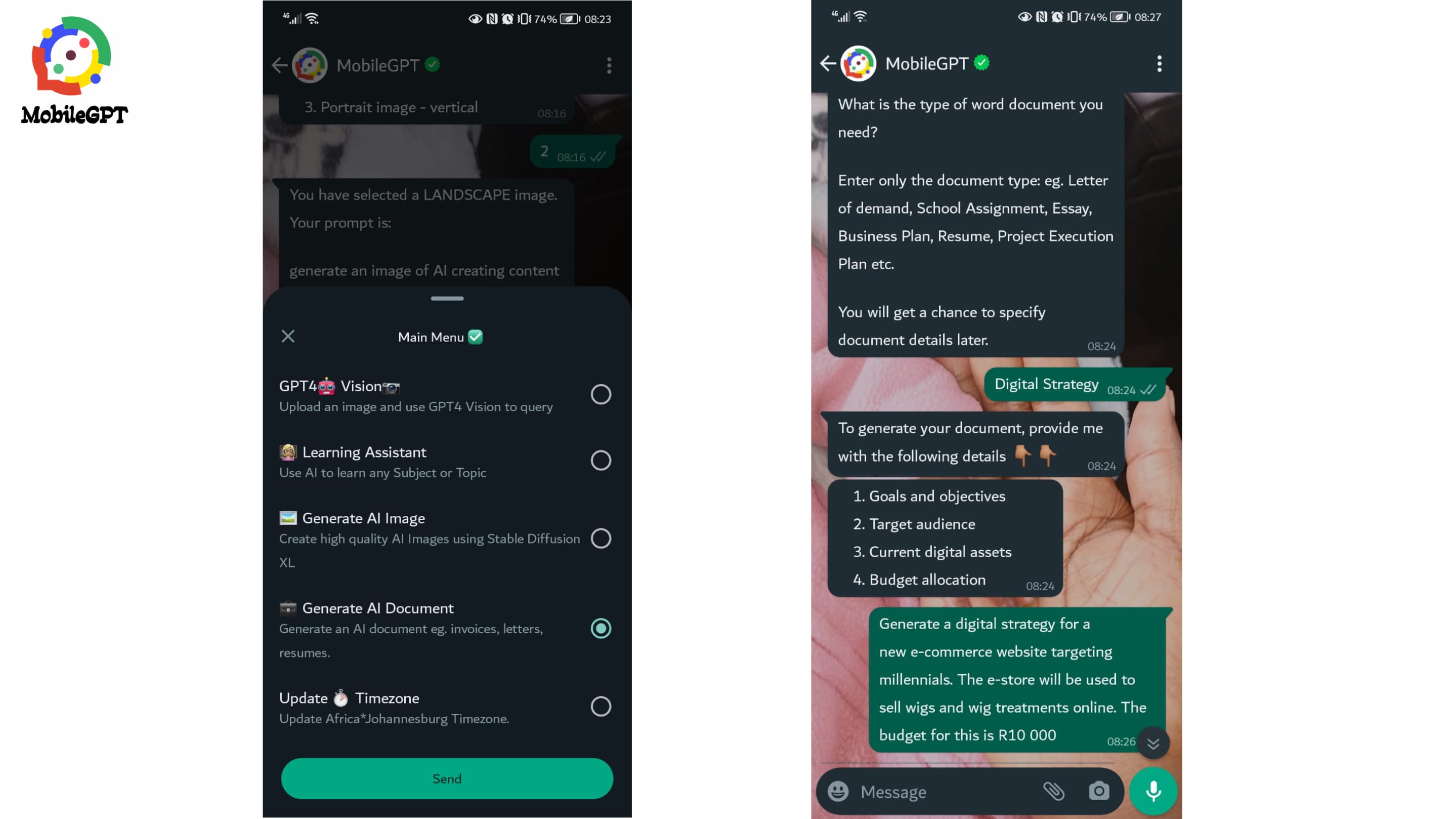
Then you can tell the AI what Exactly Do you want. Example Prompts for MobileGPT: “Generate a digital strategy for a new e-commerce website targeting millennials. The e-store will be used to sell wigs and wig treatments online. The budget for this is R10 000”
The response will look like this:
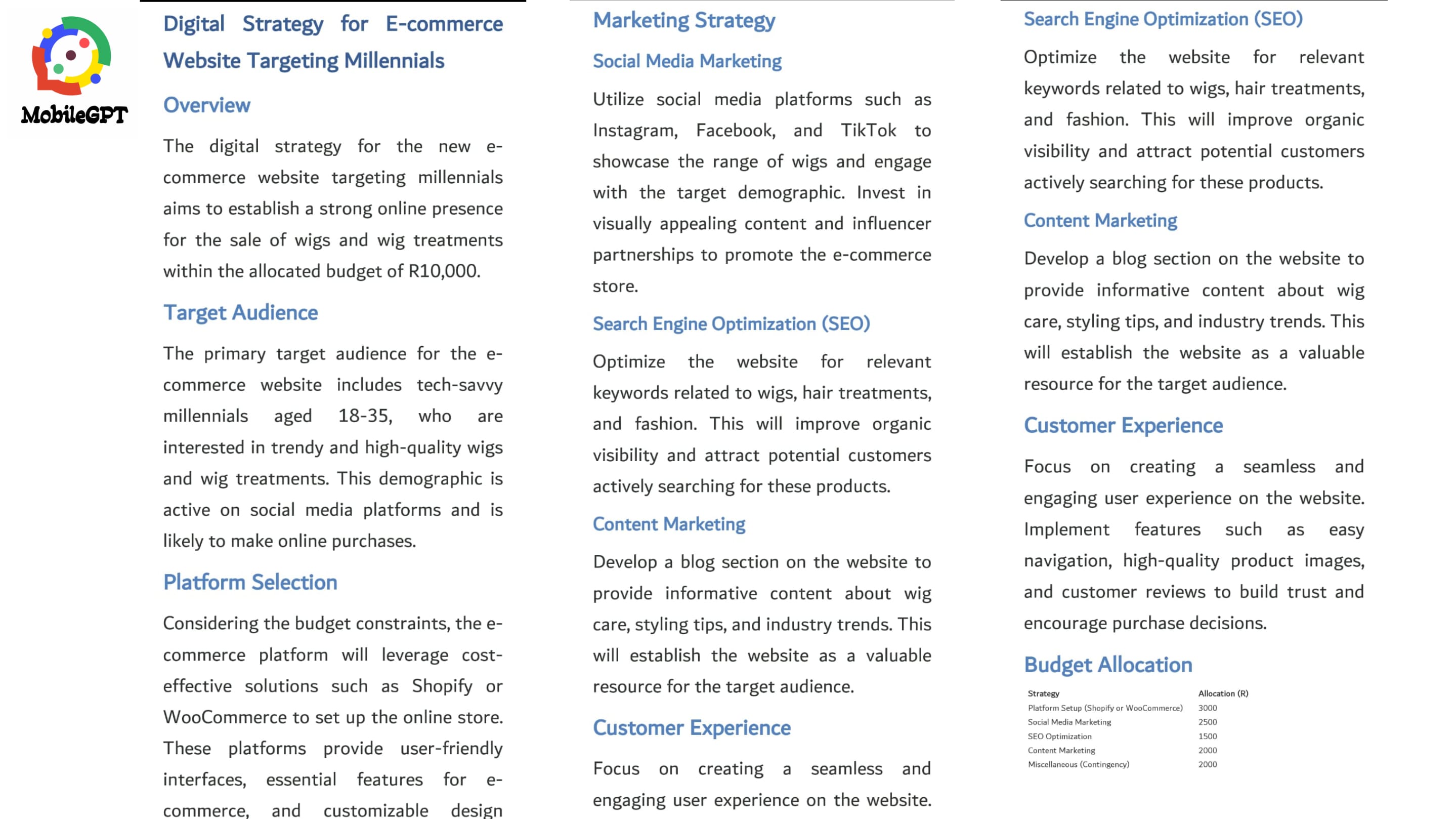
It's important to keep in mind that while AI offers remarkable capabilities, its scope is not without limits. You have the flexibility to tailor the output by adding or removing elements that may not align with your specific needs. The intervention of a human eye is always encouraged, providing a critical layer of oversight that ensures the final product not only meets but exceeds expectations. This blend of AI efficiency and human insight is key to achieving the best results.
By utilizing MobileGPT and similar generative AI tools, businesses can not only streamline their digital strategy development process but also ensure that their strategies are forward-thinking, personalized, and highly responsive to market dynamics and consumer behaviors.
Part 2: Marketing with Generative AI
Once a comprehensive digital strategy is in place, the next step is to develop a targeted marketing plan that translates strategic goals into actionable marketing objectives. Generative AI, particularly tools like MobileGPT, plays a crucial role in this transition, offering innovative ways to analyze markets, understand consumer behavior, and create engaging content. This section delves into how businesses can seamlessly move from strategy to execution with the help of AI, focusing on the development, implementation, and optimization of marketing plans.
Transitioning from Strategy to Marketing Plan
The bridge between a digital strategy and a marketing plan is made by aligning the broader strategic goals with specific marketing objectives. This alignment ensures that every marketing initiative directly contributes to the overarching aims of the organization, whether it's enhancing brand visibility, increasing customer engagement, or driving sales.
AI transforms modern marketing by providing deeper insights into customer preferences, predicting market trends, and automating routine tasks. This allows marketers to craft personalized experiences, optimize campaign performance in real-time, and focus on creative and strategic tasks by leveraging AI's analytical and generative capabilities.
Developing a Marketing Plan with MobileGPT
By leveraging generative AI tools like MobileGPT in the transition from digital strategy to marketing plan execution, businesses can ensure that their marketing efforts are not only aligned with their strategic goals but are also optimized for efficiency and impact. This approach allows for the creation of marketing campaigns that are innovative, data-driven, and highly tailored to the target audience, ensuring maximum engagement and return on investment. Businesses can tailor their marketing efforts for maximum impact using MobileGPT.
Example Prompts for MobileGPT: "Create a marketing plan based on the digital strategy for the e-commerce website targeting millennials. We will be marketing on Facebook, Instagram, LinkedIn, and Twitter” This prompt helps in generating a detailed content roadmap that aligns with the digital strategy's goals, tailored specifically for the target industry.
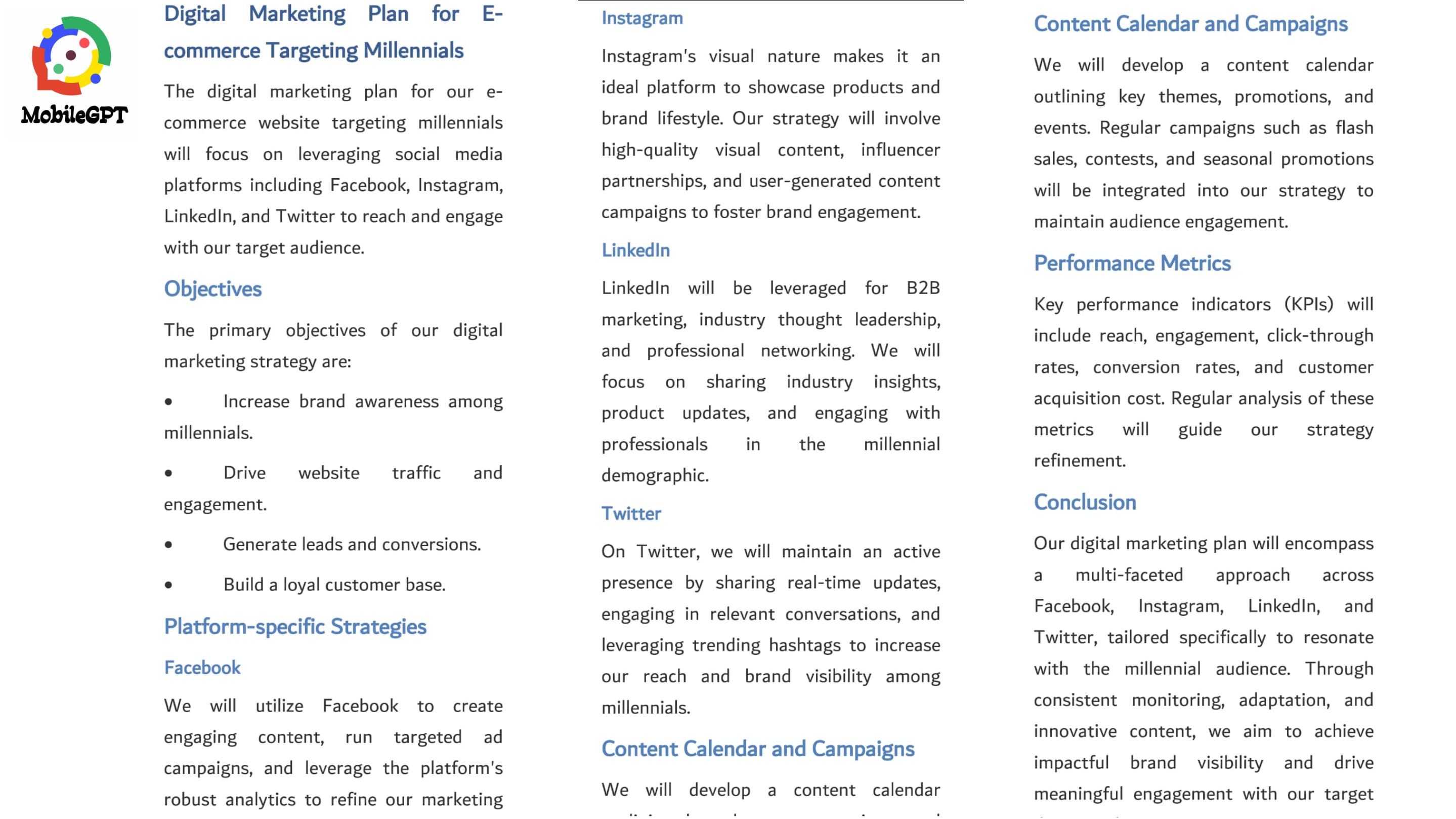
Part 3: Content Creation with Generative AI
Content is the cornerstone of any effective digital strategy and marketing plan, serving as the medium through which a brand communicates its value proposition, engages with its audience, and drives toward its strategic goals. The advent of generative AI has revolutionized content creation, enabling the production of unique, engaging, and highly tailored content at scale. This section explores how generative AI, particularly tools like MobileGPT, can be harnessed to create compelling content that resonates with target audiences, ensuring coherence across strategy, marketing, and content creation.
Content creation is a multifaceted process that involves a variety of key components to ensure that the end product is engaging, relevant, and valuable to the target audience. Below are some of the essential elements that constitute effective content creation:
- Audience Research: Understanding who the content is for is paramount. Audience research involves identifying the target demographic, their interests, challenges, and preferences. This knowledge shapes the content, making it more relevant and engaging to the intended audience.
- Content Strategy: A clear content strategy outlines the goals, key messages, and distribution channels for the content. It ensures that all content aligns with the brand’s objectives, values, and audience needs. This strategy also includes planning for content types, publication frequency, and performance metrics.
- Topic Selection: Choosing the right topics is crucial for capturing and maintaining the audience's interest. Topics should be relevant to the audience's interests and challenges, as well as aligned with the brand’s expertise and objectives.
- SEO Optimization: Search Engine Optimization (SEO) is essential for ensuring content visibility online. This includes keyword research and integration, meta descriptions, and optimizing content structure for search engines to improve ranking and visibility.
- Content Format: Selecting the appropriate format for content—whether it be blog posts, videos, podcasts, infographics, or social media posts—is critical. The format should cater to the preferences of the target audience and the nature of the message being conveyed.
- Quality and Originality: High-quality, original content is more likely to engage readers, encourage shares, and establish brand authority. This involves well-researched, thoughtfully written, and professionally presented content.
- Visuals and Multimedia: Incorporating visuals and multimedia can significantly enhance the appeal and engagement of content. This includes images, videos, infographics, and interactive elements that complement and enhance the textual content.
- Brand Voice and Personality: Maintaining a consistent brand voice and personality across all content helps in building brand recognition and loyalty. The content should reflect the brand’s values and resonate with the audience on a personal level.

From Strategy and Marketing to Content Creation: Ensuring Coherence
The transition from strategy and marketing plan to content creation requires a coherent approach that ensures all content aligns with the brand's objectives, voice, and audience expectations. MobileGPT can play a critical role in maintaining this coherence by generating content ideas and drafts that are consistent with the established digital strategy and marketing objectives.
Creating Content with MobileGPT
MobileGPT chat stands as a revolutionary tool in the realm of digital content creation, offering an unparalleled capacity to generate a diverse array of content with ease and precision. From crafting compelling blog posts that captivate readers, to scripting engaging video content that resonates with viewers, MobileGPT's capabilities extend far beyond the basics. It can also assist in creating detailed articles, informative newsletters, and even social media posts designed to enhance engagement and foster community.
Furthermore, MobileGPT can be instrumental in developing marketing materials, such as ad copy and email campaigns, tailored to specific audience segments. This versatility makes MobileGPT an invaluable asset for content creators, marketers, and businesses alike, providing them with the tools to produce high-quality content efficiently, thereby saving time and resources while maintaining a high standard of creativity and relevance.
You have to navigate to MobileGPT then on the chat you can just your prompt.
Example Prompt 1: "Generate a series of blog post titles for the e-commerce website selling wigs and wig treatments targeting millennials." This prompt can help in brainstorming blog post ideas that not only attract the target audience but also support the broader goals of the digital strategy.
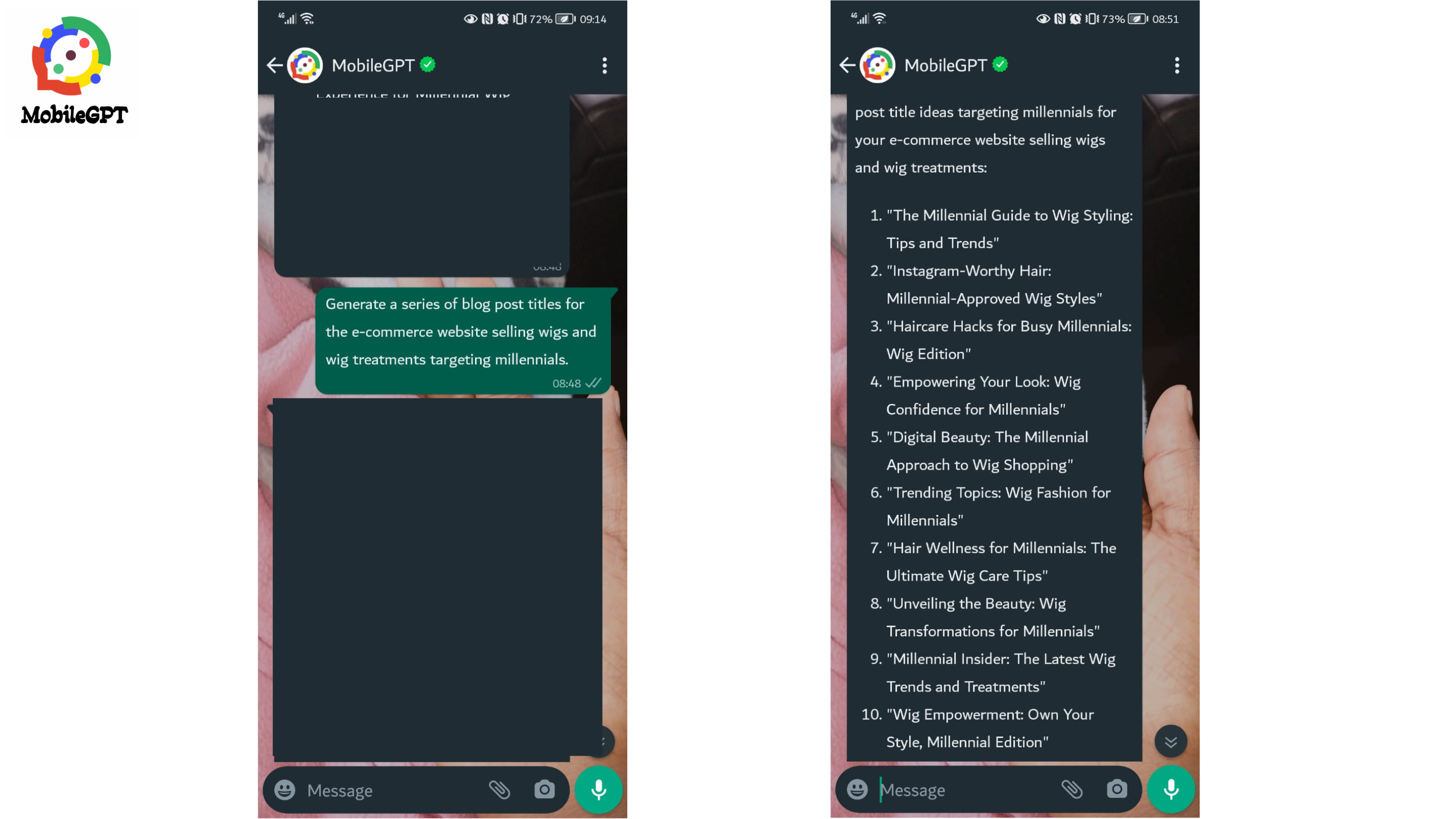
Should the suggested blog titles not align perfectly with your vision, feel free to continue exploring alternatives until you find the ideal match. Additionally, you have the liberty to modify and tailor these titles as needed to suit your specific requirements.
Example Prompt 2: "Create an engaging script for a video ad that highlights our unique selling proposition" Utilizing MobileGPT to generate video scripts ensures that the content is not only engaging but also effectively communicates the brand's unique value to the desired market segment.
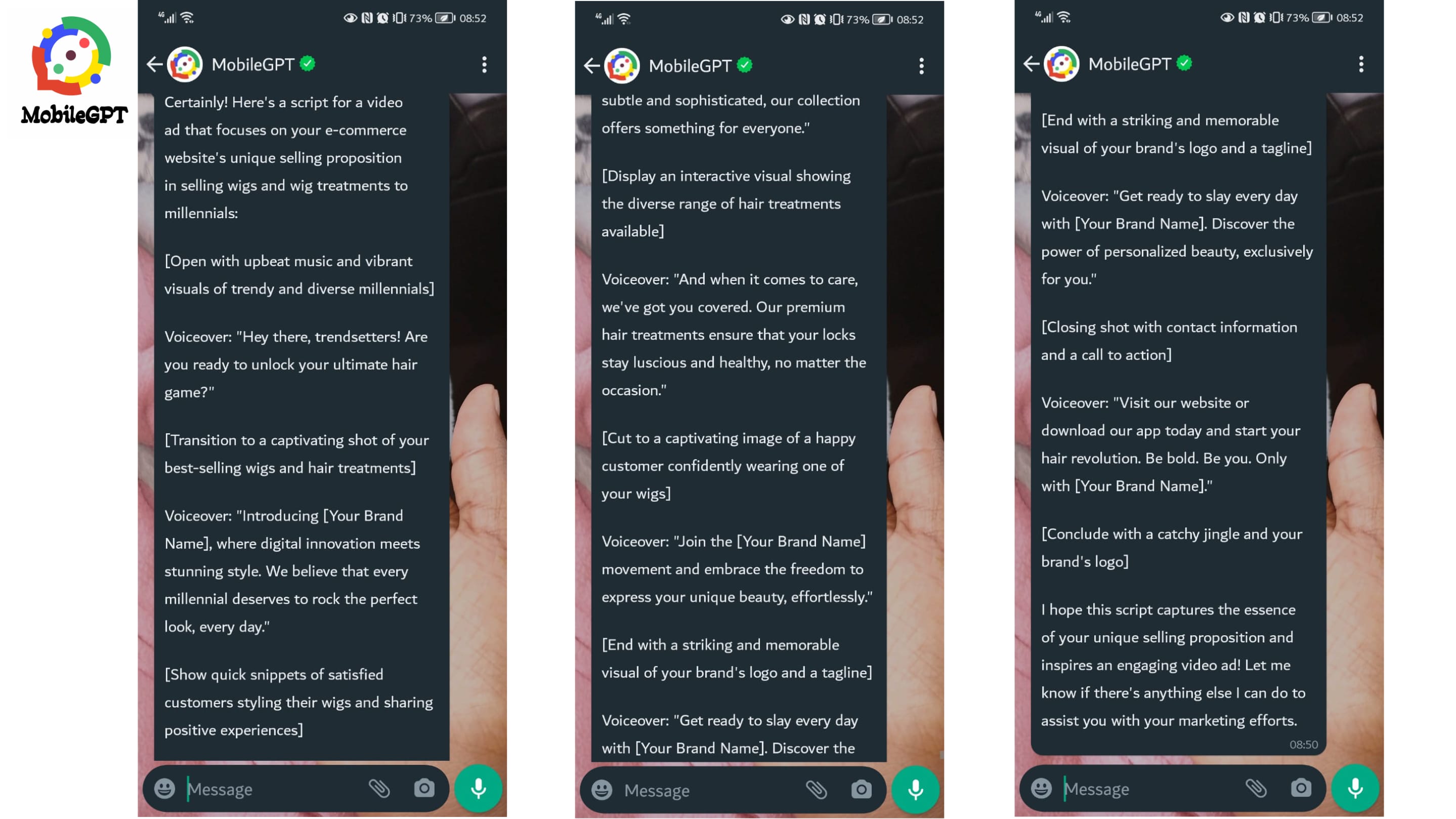
While AI can significantly streamline the content creation process, human oversight remains crucial to ensure that the generated content meets quality standards and accurately reflects the brand's voice and ethos. This involves reviewing and refining AI-generated content to maintain authenticity and emotional resonance with the audience.
Encouraging Exploration of Generative AI
The landscape of digital strategy, marketing, and content creation is rapidly evolving, with generative AI standing at the forefront of this transformation. As we delve deeper into the age of AI-powered creativity, the potential for generative AI to revolutionize these domains becomes increasingly evident. These technologies not only offer unprecedented efficiencies and capabilities in generating ideas and content but also enable personalized, engaging, and innovative strategies that were once beyond reach.
The future of AI-powered creativity promises even more integration into the fabric of digital practices, where AI's role extends beyond a tool for content generation to become a collaborator in strategic planning and decision-making. As AI technologies continue to advance, their ability to understand and predict consumer behaviors, automate complex processes, and create compelling narratives will further enhance their value to digital professionals.
Call to Action
Dive into the world of generative AI by experimenting with tools like MobileGPT. Start with simple prompts to understand how AI can augment your creative process, then gradually explore more complex applications, from strategic planning to content generation and beyond. Visit MobileGPT today and enjoy your 24 hour free trial: https://wa.me/message/TRQTFU2TZDBGP1 and sharpen your creativity.
